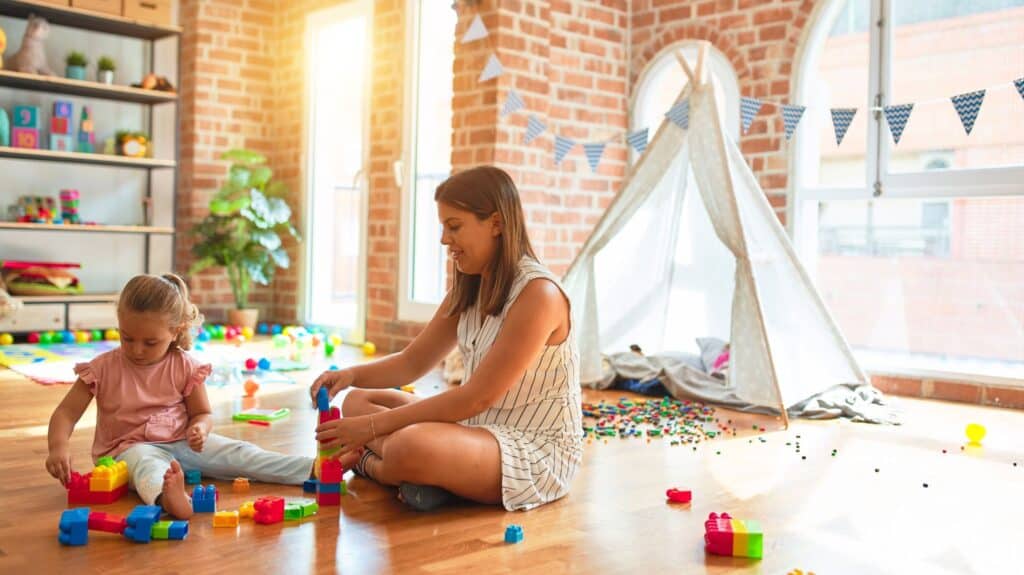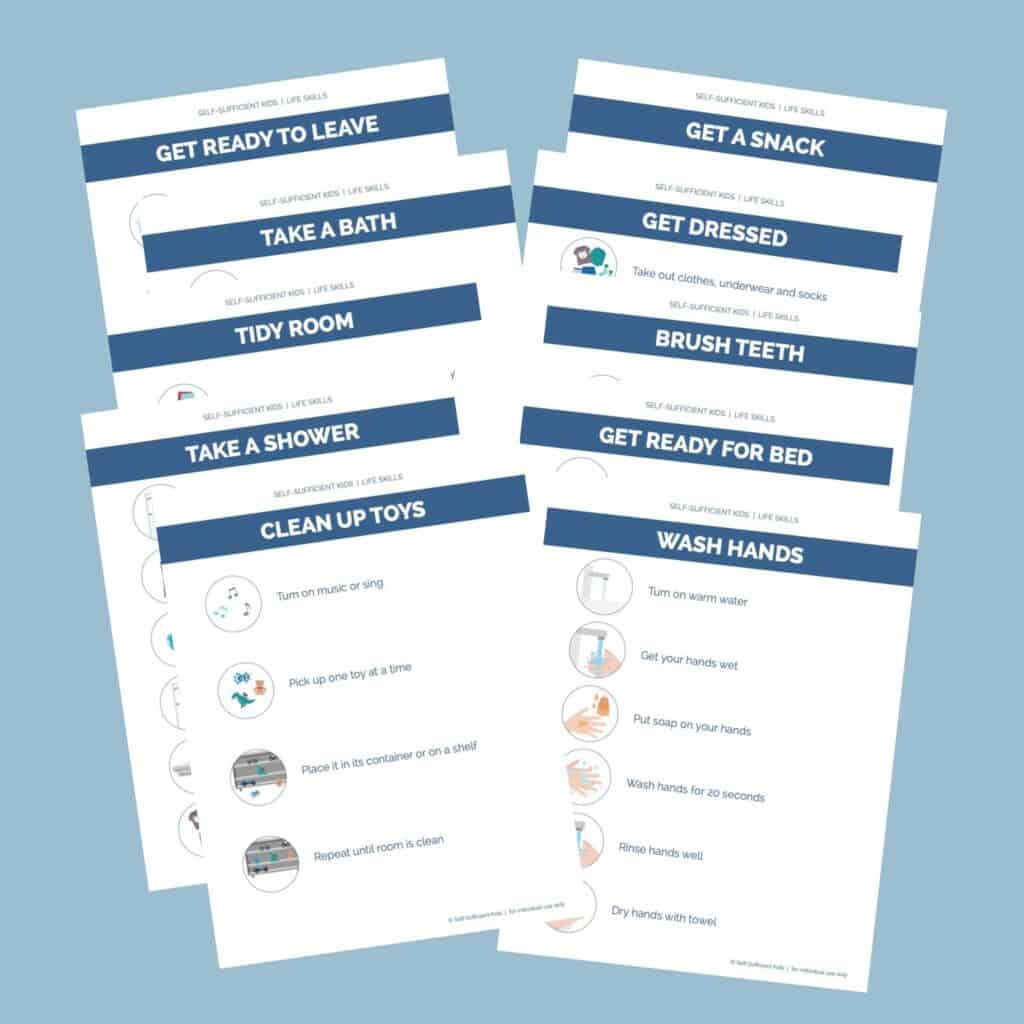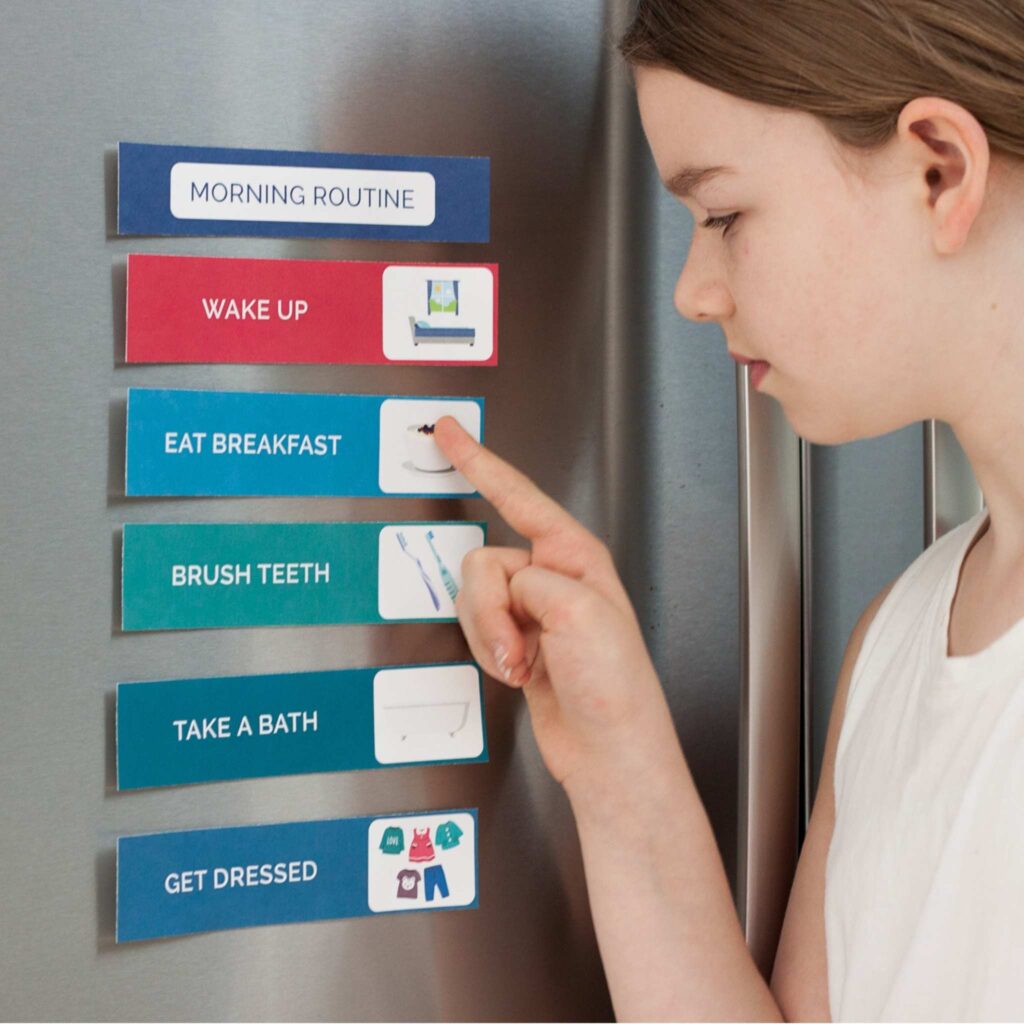How to Get Toddlers and Kids to Clean up Toys in Six Easy Steps
Cleaning up toys after play is a perfect opportunity for toddlers and kids to learn responsibility. Here’s how to get your child to help without a struggle.
Toddlers and young children are like human tornadoes — all it takes is a moment with your back turned to discover that your child’s bedroom (and the hallway, living room, and kitchen) has become the sight of a minor toy explosion.
As much fun as it is for them to be surrounded by all their favorite stuffed animals, toy cars, and coloring books, you know that at some point someone will have to clean it all up.
Most likely, clean-up time isn’t going to be the part of the day your child looks forward to.
However, there are simple ways to take this undesirable, seemingly impossible task and turn it into something fun while also giving your child a heightened sense of responsibility.
So how exactly do we make the cleaning process a more enjoyable and regular routine for our kids? Follow these strategies to create good habits for your younger children that last.
At what age can kids pick up toys?
The process of cleaning up toys can start quite early in a child’s life. In fact, the earlier you have your kids cleaning up after themselves, the better!
Young toddlers have enough motor skills at 18 months to clean up after themselves. The advantage starting at this age is that toddlers are eager helpers; wanting to model whatever they see their parents doing. But it’s important to keep in mind at this point, that toddlers l will still need a parent alongside them to help pick up.
As kids get older, they can be expected to clean up independently. Framing it as a positive, such as being given a big-kid responsibility, can help with motivation.
It’s easy to get distracted by how well older children clean up. Instead, recognize that they’re still learning and developing and will need our respectful guidance and support as they learn to master tasks.
How do you get your child to clean up their toys without a battle?
Chances are, your young child will not initially understand why it’s important to clean up their toys. Even after explaining it to them, it’s likely that they’ll still protest.
At the end of the day, all kids want is to have fun and for playtime to never end! Even so, they must understand the natural consequences of numerous emptied toy bins and scattered toys.
To motivate your child to be an active participant when it is time to clean up toys, you can…
Make cleaning up toys and messes the expectation
Setting the expectation of a clean room after playtime creates a sense of normalcy around the task. This will prevent your child from being taken off-guard when clean-up time does come around.
The best way to set expectations is to teach your kids how to clean up at an early age.
But if you didn’t start this habit with your kids when they were young, have a conversation with your child(ren) about how cleaning up will be the new norm and ask for their input on how you’ll, as a team, complete this task. Getting kids input will increase their buy-in and make them more willing to contribute.
Kids will also appreciate it if you give them a heads-up about when it will be time to clean up. You can start with ten minutes, followed by five, and then end with a final one-minute warning. This way, they know what’s coming and will be mentally prepared to take on the task with more acceptance.
Make cleaning up a part of your routine
Routines help give children structure. And with this structure, you set a good example that lets your child know what’s expected of them throughout the day.
It can be helpful to have a specific time of the day when clean-up happens. For example, it could be right before nap time or before you eat dinner.
When kids know and expect that something will happen at a certain time each day, they’ll be less likely to show resistance.Why? Because they’re used to doing it on a regular basis.
Model clean-up
As much as we wish it were true, kids and toddlers are not born knowing how to clean up for themselves. They will need someone to model the behavior for them – and that is where you come in!
That old saying, “kids are like sponges” doesn’t come from nowhere, and is true for cleaning up toys. Children naturally see their parents as their role models, which means when you show your child how to clean up, they’ll want to mirror the behavior.
Take advantage of this simple trick, especially when they’re at a young age that’s more impressionable. It’s a great time for teaching your child the life skills necessary to be more self-sufficient, which will, in turn, make everything much easier for you in the long run.
Create a place for every toy
Kids will be more capable of putting toys away if there’s a place for everything, and they know exactly where it all goes. Not only does this help them keep track of their toys, but it also enhances their problem-solving and organizational skills.
When your child has a “home” for every set of toys, it creates a structure that makes it easier and quicker for them to clean up. They’ll experience less frustration because they aren’t having a hard time figuring out where things should or shouldn’t go. Instead, they have a solid plan and a more positive clean-up session.
See related: How to Create A Playroom that Fosters Creative Play and Invention
Help guide your young child through everyday tasks with these Simple Directions for Young Children Cards. Each card serves as a reminder of how to carry out a task and allows children to eventually take on tasks independently. Click here to learn more.
Make clean-up fun
Getting your kids to clean up toys is much easier when you can turn it into a fun activity. When it’s time to clean up, turn on music or an audiobook to sing along or listen to as they clean their play area.
You can also sing a clean-up song, turn it into a fun game like a scavenger hunt, or playfully say, “I wonder how quickly you can put the blocks back in their bin?” as a fun way to motivate them into the task.
So when in doubt, make it fun! Cleaning up doesn’t have to be a boring activity, and it will bring about a positive association with hard work that’ll make the task even easier next time.
See related: 16 Clean Up Songs That Will Get Kids Excited to Do The Work!
Don’t force the issue
The more we push our kids, the more likely they are to resist. To avoid an argument or power struggle, be empathetic towards how your kid is feeling in the moment, and be willing to work together and decide the best way to get the task done.
Sometimes kids have bad moments, are hungry, or are tired. Rather than force them to clean up their toys while in this state, show them empathy and postpone clean-up to a later time in the day. This will give them time to take a deep breath and feel better prepared for the task.
Kids, and especially toddlers, can get overwhelmed by a big mess. If this is the case for you, break up the time when you clean up toys. Have them clean up a little mess, take a break, then clean a little bit more. This way, it won’t seem as much of a big deal and will make the chore more manageable.
What if my child still refuses to pick up?
If you tried all these tips but still can’t get your child motivated to clean up their toys, don’t worry! You are not the only parent who has experienced this.
When talking with your child, avoid criticism or condemnation. This will only make them feel bad about themselves and discourage their cooperation. Instead, let them know in a respectful, matter-of-fact way that as soon as the toys are cleaned up, you can move on to another, more favorable activity such as going to the park, reading a book, etc.
If you have older kids who still struggle to clean up independently, it may be helpful to ask them what the challenge is. Maybe they’re overwhelmed and need help figuring out how to clean up. Take this opportunity to model what you would like them to do. Visuals like chore charts can also be beneficial with this.
Let go of perfection and keep the focus on raising helpers
Few children will clean up to the standards of their parents, so it’s essential to be patient and show them how much you appreciate their effort.
When getting your child involved in cleaning up, make the goal nurturing a helping mindset and not achieving a perfectly clean room. In time, your child will get better at cleaning up their toys, but few kids master this skill from the beginning. .
Not only will your child benefit from these skills, but so will you! As your child matures, you’ll have a child who’ll naturally view themselves as a responsible and capable family member – making your job as a parent that much easier.
See related:
7 Tips to Help You Begin Toddler Chores Successfully
How to Encourage Independent Play (and Why It’s so Important)
“I can do it myself!” – How to Parent (and Survive) the Independent Toddler Stage
10 Parenting Practices That Pay Big Dividends When Kids Are Older
Calm your crazy mornings (and afternoons, and evenings!) with these routine cards for kids. These cards allow kids to independently check what they need to do and in what order – so you don’t have to remind them! Click here or the image below to learn more.
What to do next…
1. Subscribe to Self-Sufficient Kids’ email list.
Like what you read here and want to learn more? Every Thursday I’ll send you one parenting tip about raising self-sufficient kids and creating the peaceful relationship you yearn to have with your child. Click here to sign up.
2. Take one of my quizzes!
Find out if you’re raising a self-sufficient kid (click here) or if you’re doing too much for your kids (click here). At the end of each quiz, you’ll be asked to provide your email address to see the results.
3. Get your kids started on chores.
Learn how to get your child started on chores (& keep them motivated + avoid power struggles) by enrolling in my Get Your Kids Successfully Started on Chores course. Click here to learn more and sign up.

About Kerry Flatley
Hi! I’m Kerry, the mother of two girls and a certified parent educator. I believe it is possible for parents to have a supportive, loving, and warm relationship with their kids while raising them to be independent and ultimately self-sufficient. Over the years, I’ve read numerous books and articles that support this belief and I’ve put these ideas into practice with my own kids. Read more about me and Self-Sufficient Kids here.




